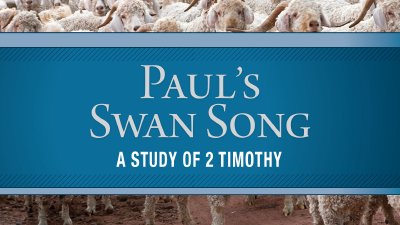


Paul's Swan Song
14 Sermons on 2 Timothy
Urgent Words from a Dungeon
Pastor Chuck Swindoll
Second Timothy is Paul's “swan song.” He wrote nothing more once he completed these words to Timothy, his “son in the faith.” The aging apostle, spending his last hours in a Roman dungeon, could feel the hot breath of death on the back of his neck. He was lonely, cold, abandoned, and flooded with memories . . . but he was not timid or desperate. These may be Paul's final words, but there's no self pity or bitterness—only candor and urgency. The letter is emotional, personal, and passionate. Writing by candlelight, he expressed deep affection mixed with strong exhortations, insightful instruction, and intimate reflections. He was passing the torch to a man who was younger than he, whom he hoped would grasp it firmly and carry it for the rest of his life and ministry with confidence and conviction. Here is a powerful letter for the ages, written by a rugged, battle-weary warrior, preserved for all of us to read and heed so that we might finish the race strong and well.
Tender Words from a Mentor
Pastor Chuck Swindoll • 2 Timothy 1:1–7
Few things are more encouraging than a letter from a mentor. The words of reassurance, the reminders of meaningful days gone by, and especially that personal touch, which cracks through our outer shell and resonates within our hearts, makes letters such as these permanent fixtures in our minds. We don't forget them—we can't! One day, while pressing on through several trials and personal struggles, Timothy was handed this letter, written by the man who meant more to him than any other man on earth. As he sat down and began to read it, he was surely gripped by a rush of emotions. His eyes were glued to the page. How he missed this man who had invested so many years of his life in him! What a deep and satisfying feeling to know that his spiritual father continued to care and to pray for him . . . and to read that he longed to be with him. By putting ourselves in Timothy's place, the words of Paul take on new meaning. If you will allow your imagination to take you there, this letter will “come alive” afresh and anew. Let that happen today.
Straight Talk to the Timid and Reluctant
Pastor Chuck Swindoll • 2 Timothy 1:8–12
Not all of God's spokespersons are confident and bold. Not every leader is ready to stand strong and all alone, if necessary, in the face of conflict. There are some who have been called to do God's work but are timid, shy, and fearful. This was true even among some whose names appear in the Bible. Stop and think. Let's call some of those people to mind. Without trying too hard we could name some who were reluctant (remember Moses at the burning bush?), others who were hesitant (like Esther, when she first considered presenting her case before the king), a few who lacked courage (as King Saul did before the giant, Goliath), and occasionally we find one who was downright resistant and rebellious (think Jonah). It shouldn't surprise us, then, that a 30-something-year-old pastor named Timothy was in that same category. Perhaps his shyness could be traced to his ill health. Maybe it stemmed from personal feelings of intimidation that only intensified while travelling with Paul—a man of enormous courage and grit. Whatever the cause, Paul knew that the future Timothy faced would require his strongest and best efforts. Having affirmed Timothy's godly roots and sincere faith (2 Timothy 1:5) and having urged him to “kindle afresh” the gift God had given him (1:6), Paul now offered straight talk on courage and persistence.
Two Eternal Investments
Pastor Chuck Swindoll • 2 Timothy 1:13–18
Time was short. The end was near. The aging apostle Paul could almost feel death's hot breath down the back of his neck. As we would expect, he didn't mess around with trivial things in writing his final words to his “son in the faith,” Timothy, who would soon carry on without him. With emotions at fever pitch, Paul plunged right in as he addressed matters of highest priority. And it isn't surprising that he included numerous commands and reminders, since this would be Paul's final letter. We can only imagine how often Timothy returned to his mentor's words in the years that passed . . . including these six verses we're looking at today. Just a quick glance over these verses reveals how clearly and urgently Paul put his finger on two eternal investments that Timothy (and we) must make in life. May they make a profound impact on us today!
Traveling a Rough and Rugged Road
Pastor Chuck Swindoll • 2 Timothy 2:1–13
Some things are easy to hear, bringing comfort and encouragement to smooth life's rough edges. Other things are difficult to hear, telling of pains to endure and troubles to face. We grin at the one and grimace at the other. But if we're honest, we know that growth comes through overcoming difficulties—by trudging down the rock-strewn, overgrown, untrodden path that takes us to vistas unseen. As we arrive at 2 Timothy, chapter 2, Paul calls attention to a truth you'll not hear from most televangelists . . . or from anyone who tells you what you want to hear. Instead, he points us to a rough and rugged road that is neither popular nor fun to take. This road, “the one less traveled,” is a journey we may resist and resent, but it leads to every Christian's desired destination: maturity.
Accurately Handling the Word
Pastor Chuck Swindoll
When Paul wrote this second (and final) letter to Timothy, he knew that his death was near. He had far more to say than time permitted. Understanding this, Paul must have mentally separated the essential from the incidental, then focused his mind and energy only on those things he considered most important. All who realize this when reading 2 Timothy immediately understand why so much is packed into such little space. It's almost as if each word has been weighed in light of its significance, then carefully selected for the purpose of driving home only those things that Timothy (and we) must value, defend, and put to use. As we'll see, words can be powerful building blocks that lead others into reliable truth to live by—or they can be dangerous missiles that explode in others' minds, causing great damage. It concerned the aging apostle Paul that there were those on the loose who had “gone astray from the truth.” Small wonder he exhorted his younger colleague to conduct himself appropriately before God, “accurately handling the word of truth.”
Christian Leadership 101
Pastor Chuck Swindoll
With such a dominant emphasis on public performance these days, not enough is said regarding the value of character among those who stand before the public. Whether a person is a leader in business or politics, medicine or law, technology or public service, industry or education, or promotion of sales, almost all the training received addresses personal skills, efficiency, and competence. Virtually nothing is said regarding the individual's morality and integrity. Our culture underscores the externals while Scripture constantly emphasizes the inner life. No matter what our occupations or roles in life may be, the Bible forever points to issues related to our hearts and souls—those things that have to do with character. This is especially true when it comes to the Christian leader, regardless of a person's specific calling. Paul addresses this issue of character in this second (and final) letter to Timothy. His deepest concern is that the young man be “a vessel for honor . . . useful to the Master” (2:21), not simply an efficient pastor or a strong preacher. What is written to Timothy certainly applies to each of us.
Depravity on Parade
Pastor Chuck Swindoll
Whatever we may say about the Bible, we may be sure of this: it tells us the truth, the whole truth, and nothing but the truth. We may not want to hear it or face it, but nevertheless there it is: realism in the raw. Like no other book in existence, it enables us to see the ugliness of sin. God's Word strips off all the veneer of fanciful optimism as it cuts to the chase and reveals the evil that lurks in the dark shadows of the world around us. It goes far deeper as it exposes the nature within us . . . the subtle temptations that allure us, the shameful thoughts we'd rather keep secret, and even the selfish motives we try to hide. Some sections of the Scriptures are painfully clear when it comes to this kind of realism—and the verses we're looking at today represent a classic example. Since “all the world's a stage,” as Shakespeare once wrote, Paul pulls back the curtains in the initial verses of 2 Timothy 3 to give us a glimpse of how wicked this world has become and how treacherous our times really are.
Making a Lasting Difference
Pastor Chuck Swindoll • 2 Timothy 3:10–14
Enough of the negatives! The apostle Paul has gone to great lengths to help us all understand the depths of depravity. He offers no fewer than 19 characteristics that comprise “difficult times” as he paints the scene of society in dark shades and ugly shadows. But enough of that! It's time to emphasize the positive. What can we do to make a real impact in a world like ours? We start by understanding the value of being men and women of God, who face the raw reality of our times . . . yet refuse to allow all of that to squeeze us into the world's mold. Accomplishing that all-important pursuit means we must focus on the goal, then come to terms with what it takes to get there. When we do, there is nothing to keep us from making a lasting difference.
God-Breathed Truth
Pastor Chuck Swindoll • 2 Timothy 3:14–17
Those who make a lasting difference finish well. They don't merely start well or maintain well, they finish well. They stay in the race all the way to the finish line. They endure. They persevere to the end. As one man put it, they sustain “a long obedience in the same direction.” This was Paul's great hope for Timothy, who had received a solid foundation that set him on his way—he started well. He had proved himself a faithful traveling companion and loyal disciple of Paul for years—he maintained well. Both were certainly commendable, but neither was enough; Timothy needed to finish well. With Timothy about to be on his own without Paul's presence and encouragement, the question he must answer was, “How?” As we shall see, the answer has everything to do with how greatly he valued, how diligently he studied, how strongly he defended, and how personally he embraced and applied the God-breathed truth of Holy Scripture. What was true for Timothy is equally true for us: we will finish only as well as we stand for truth.
Every Pastor's Job Profile
Pastor Chuck Swindoll • 2 Timothy 4:1–5
We arrive at the last chapter written by Paul the apostle. Death awaited him. It would not be long before Paul was pulled by Roman soldiers from the dark and dismal underground Mamertine dungeon. He would then be led, bound in shackles as a criminal, along the Ostian Way toward the sea where his executioner's axe would fall across Paul's neck. These are, literally, the man's concluding words to his much-younger colleague in the work of ministry, Timothy, who served as the pastor of the church at Ephesus. Not surprisingly, Paul delivered a solemn, never-to-be-forgotten charge to Timothy that provides a timely (and timeless) message to all pastors, regardless of age, era, personal temperament, geographical location, or cultural setting. There cannot be found in all of Scripture—or all of literature for that matter—a more necessary or relevant statement setting forth every pastor's job profile than these first five verses of 2 Timothy 4.
Looking Back—No Regrets
Pastor Chuck Swindoll • 2 Timothy 4:6–8
We learned at the beginning of our study of 2 Timothy that we were examining Paul's “swan song.” This letter comprises the last recorded words Paul wrote prior to his death. The fourth chapter reveals that this rugged missionary and remarkable apostle of grace knew he had come to the end of the trail. Paul was turning the final corner as he headed to his eternal home. Most of us will come to our final hours of life without realizing it. As James wrote, “You do not know what your life will be like tomorrow” (James 4:14). For all we know, we may have another ten years to live; then again, we may not have ten days—or for that matter, ten hours! Paul was different; he knew his days were few in number. That explains why he wrote what he did in the section of Scripture we're considering today. Up until that point, he had written Timothy in hopes of preparing him for what he would surely face in the months and years ahead. But now he wrote about himself. Without a glimmer of fear and without a hint of regret, Paul wrote one of the finest epitaphs found in all of literature.
A Circle of Honor and Dishonor
Pastor Chuck Swindoll • 2 Timothy 4:9–15
It is intriguing what passes through the minds of those who reach the end of life's trail. Events of yesteryear return to their memory as time momentarily stands still, and they get caught up in the reverie of scenes that occurred long ago. In such mental journeys, words spoken are remembered and rehearsed as if they were uttered yesterday. In addition, there are people who step out of the past, whose faces are mentally visualized and whose deeds are clearly recalled, often in detail. During our busy years, we seldom pause long enough to reflect. However, as the lingering hours of twilight slow our pace, many people and places pass in review. So it was with the aging apostle Paul as his death drew nearer. In these seven verses, Paul recalls those who stood alongside him as loyal friends in his previous years as well as those who broke his heart and/or caused him harm. These names form a circle of honor and dishonor.
Grace to the Very End
Pastor Chuck Swindoll • 2 Timothy 4:16–22
Answer this: if you knew you had one more day to live, how would you spend it? Here's another: if you wrote a letter to someone during that time, what would you write? It's hard to think about those two questions—and even when we do, it is difficult for us to answer either one of them. Quite possibly we'd have feelings of resentment toward those who gave us grief in years gone by, causing us to struggle with bitterness during our final hours. Perhaps a host of discouraging memories would swarm us, prompting us to record those things we should have done, but we didn't—or should not have done, and yet we did. That means we'd spend our closing hours on earth struggling with regret. There's a far better option awaiting us—but we must determine long before our last days to move in that direction. And what option is that? In a word: GRACE. However, before we can expect to experiencing dying grace, we must learn the value of living grace from one day to the next. The apostle Paul is one who modeled such a life. Not surprisingly, he died such a death. Five simple words describe this man's credo: grace to the very end.


